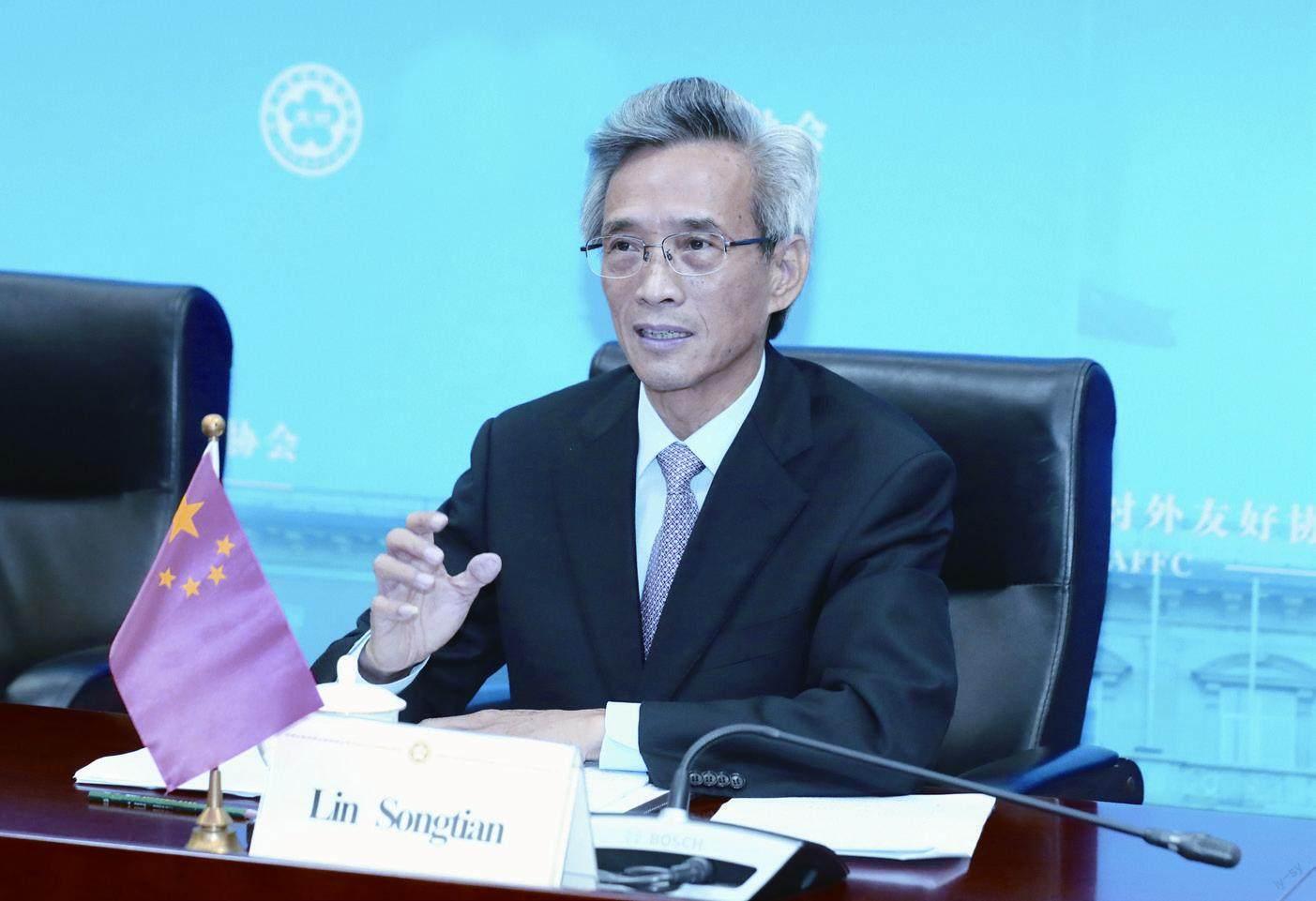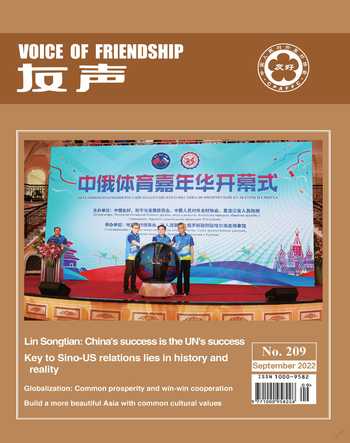Build a more beautiful Asia with common cultural values
Fu Bo
O n July 5, Lin Songtian, president of the Chinese Peoples Association for Friendship with Foreign Countries, met online with Kuroi Senji, president of the Japan-China Cultural Exchange Association. They had in-depth exchanges through video conferencing and reached points of agreement on SinoJapanese relations and friendly peopleto-people exchanges. Also attending the meeting were CPAFFC Yuan Mindao, vice-president of the CPAFFC; Kurihara Komaki, director and vice-president of the JCCEA; and Nakano Satoshi, JCCEAs executive director.
Lin expressed respect and gratitude for the long-term devotion of Kuroi Senji, Kurihara Komaki and their association to the cause of bilateral friendship and for their consistent efforts and contributions made in advancing people-to-people friendship and cultural exchanges. He said he hope to cooperate with the Japanese side to write a new chapter of friendly people exchanges and cooperation between the two countries.
Kuroi Senji said it was a great pleasure to meet with President Lin via video link.
“Chinese culture, which we have always respected, is the foundation and source of Japanese culture. Weve thought deeply about the war crimes Japan committed during its invasion of China. We have a spirit of respect and introspection that has been passed down from the founding of our association until now,” Kuroi said.
“The wise elder generations of our two countries built a solid foundation for people-to-people and cultural exchanges and left valuable experience to us. We should learn from history, and consistently facilitate exchanges and collaboration without end.”
Kuroi said the aim of bilateral exchanges is to create a friendly atmosphere and develop mutual trust so as to help the two peoples develop an interest in visiting each others countries and communicate more.
“Therefore, we should lay emphasis on enhancing exchanges and connecting hearts. In the future, we should be more focused on forging closer heartfelt connections, be more engaged in increasing mutual amity between our peoples and build a broader platform of exchanges between young people. I believe that the cause of Sino-Japanese friendship will constantly forge ahead,” he said.
Kurihara Komaki expressed gratitude for the affection Chinese audiences have for her films, as well as their support for her efforts advancing bilateral cultural exchanges. She said she greatly values her deep friendship with her Chinese friends.
She mentioned that as a Japanese actress engaged in film industry, she loves and respects Chinese culture. On the 50th anniversary of normalization of diplomatic relations between Japan and China, she said she hoped to make contributions to the cause of friendship with the help of films.
She said a historic and cultural film is being co-produced by Japan and China that tells of Zen master Yinyuans trip by sea from Fujian province to Nagasaki, Japan, bringing Chinese cuisine, architecture, literature, music and printing techniques. She hoped for more Chinese support for the film.
Lin thanked Kuroi and Kurihara for their warm words and suggestions for friendly exchanges. He also expressed willingness to support Kuriharas new film.
He noted that China and Japan are close neighbors with common cultural roots. Both belong to the same cultural circle of Confucianism and formed the Oriental culture together. The Chinese people admire the values of harmonious coexistence, he said.
Meanwhile, the Japanese people regard harmony as the essence of their culture. It has become the common aspiration of the two peoples to act under people-oriented thought and the philosophy of harmonious coexistence featuring peace, solidarity, universal harmony and harmony without uniformity. That philosophy has become an invaluable treasure of SinoJapanese relations and the Oriental values followed by both peoples.
Lin said that in the past 50 years since the normalization of diplomatic relations, China and Japan — based on their own fundamental interests and shared interests of the region —have abided by the principles stated in the four political documents signed by the two countries, stayed on the right track of peace and friendship and safeguarded the political basis of bilateral relations. By respecting each other, seeking common ground while shelving differences, learning from each other and pursuing win-win results, the two peoples have benefited from the huge bonus brought by peace and development.
He noted that bilateral trade volume had risen from less than $1 billion to more than $370 billion and more than 261 pairs of friendship cities have been established, In addition, more than 13 million mutual visits were made annually before the COVID-19 pandemic. China and Japan, as the worlds second- and third-largest economies, respectively, are important forces for safeguarding peace and promoting common development in Asia and the world at large.
Lin talked about Chinas great achievements. It has realized the first centenary goal of building a moderately prosperous society in all respects and ushered in a new journey of building China into a great modern socialist country in all respects, including common prosperity. He said that China has become the main driving force for global economic growth. As the main trading partner of more than 120 countries and regions in the world and the main source of outbound investment and tourism, China has contributed about 30 percent of world economic growth annually.
He said the Belt and Road Initiative initiated by President Xi Jinping has been well implemented. China has connected via railway with more than 180 cities in 23 countries in Europe. More than 1,000 China Railway Express trips are made every month. The high-speed railway network connecting Beijing and Singapore, which covers many Southeast Asian countries, is under construction as planned. Asia has become a community with shared stakes and a shared future.
Lin noted that the United States is unwilling to see peace, stability, development and prosperity in Asia. It is advancing its Indo-Pacific Strategy by championing the Indo-Pacific Economic Framework, trying to win Japan and South Korea over to build an Asian-Pacific version of NATO. And its coercing regional countries to side with it. Its the usual US practice to divide and destabilize a region. This kind of practice which turns back the wheels of history to reverse the tide of the times runs counter to the overall interests of regional countries and their people. Consequently, it is doomed to lose support and fail.
He said the global pivot has been shifted from the Atlantic Ocean to the Pacific. Its an irreversible trend for the East to ascend and the West to decline. Its also a reality that China enjoys good governance while the West is undergoing chaos. The 21st century is the Asian century. Developed countries, such as the United States and its European allies, are unable to solve their stubborn political, economic and social problems, including partisanship in matters of national interest, individualism and shortsightedness in national governance, the wealth gap and social populism. Unwilling and afraid to admit Chinas success, they choose to demonize China and hype up the alleged China threat, which misleads domestic and international opinion, incites ideological and group confrontation and creates more turbulence in the world.
Lin said Sino-Japanese ties are at a crossroads. History shows that the two countries could gain from cooperation but will lose in confrontation. He believes that the wise, diligent and kind Japanese people will make the right choice.
He said that Asia is our common home. Its our common aspiration to overcome difficulties with concerted effort, to coexist in peace and to live as one family. Its our common belief that every civilization can enjoy and share with each other their beauty. Our common approach to coexistence is to respect one another, seek common ground while shelving differences, conduct exchanges and dialogues, learn from one another, benefit each other and strive for common development. Its our common objective to advance the building of a closer community with shared interests and a shared future, Lin said.
“The CPAFFC would like to work together more with the Japan-China Cultural Exchange Association and other friendly societies of Japan and take the opportunities presented by the 50th anniversary of the normalization of bilateral diplomatic relations to innovate and carry out online and offline exchanges between friendly associations, friendship cities, friendly organizations and individuals under the new normal of the COVID-19 pandemic,” he said.
“When conditions permit, we need to restore as soon as possible large-scale exchanges between the young, as well as between cultural, religious and commercial groups and local governments. We need to stick to the cultural values of Asia, safeguard regional peace and prosperity, build a more beautiful Asia and write new chapters of Sino-Japanese people-topeople friendship in the new era so as to better benefit people of the two countries and in Asia at large.”
- Voice Of Friendship的其它文章
- Joint Declaration of Friendship Associations from Four Countries with Ancient Civilizations on World Peace and Development
- Online dialogue of friendship associations of four countries with ancient civilization a success
- Opening of China-Laos railway advances connectivity
- Globalization: Common prosperity and win-win cooperation
- German-Chinese friendship cities look to new opportunities for beneficial cooperation
- CPAFFC President Lin Songtian meets Uzbekistan ambassador

